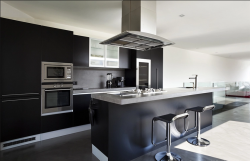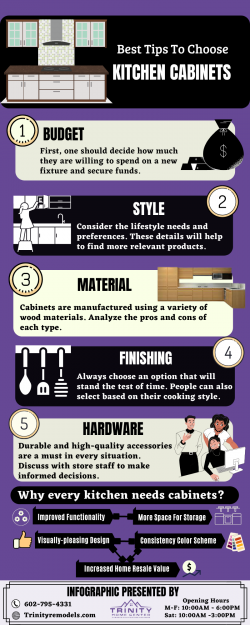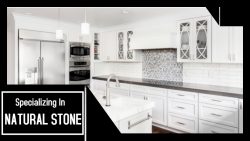Quartz Kitchen Countertops: What You Need to Know
Quartz countertops offer a harmonious blend of aesthetics, durability, and low maintenance, making them a top choice for modern kitchens. If you’re considering quartz countertops for your kitchen renovation, this comprehensive guide will provide you with everything you need to know about this remarkable material.
The Composition of Quartz Countertops
Quartz countertops are engineered stone surfaces composed primarily of natural quartz crystals mixed with resins, polymers, and pigments. These materials are combined and processed under high heat and pressure to create a countertop that is both incredibly durable and stunningly beautiful. The result is a surface that mimics the elegance of natural stone without some of the drawbacks.
A Rainbow of Colors and Patterns
One of the most enticing aspects of quartz countertops is the vast array of colors and patterns available. Unlike natural stone countertops, where the selection is limited to what nature provides, quartz countertops can be customized to suit your unique style. Whether you prefer the classic look of Carrara marble or the bold appearance of a jet-black countertop, there’s a quartz option for you. Additionally, quartz countertops can mimic the veining and patterns found in natural stone, providing an authentic aesthetic.
Unmatched Durability
Quartz countertops are renowned for their toughness. They are highly resistant to scratches, chipping, and cracking, making them an ideal choice for the demanding environment of the kitchen. This durability stems from the engineered nature of quartz, as it undergoes a manufacturing process that reinforces the material’s structural integrity.
Stain and Heat Resistance
Another notable feature of quartz countertops is their resistance to staining and heat. The resins and polymers used in their composition create a non-porous surface that repels spills, reducing the risk of stains and bacterial growth. While it’s always advisable to clean up spills promptly, quartz is much less prone to staining compared to natural stone surfaces. Additionally, quartz countertops can withstand moderately hot pots and pans, though it’s still advisable to use trivets or hot pads for extra protection.
Easy Maintenance
For busy homeowners, the low maintenance aspect of quartz countertops is a major draw. Unlike natural stone countertops, which require periodic sealing to maintain their integrity, quartz countertops need no such treatment. To keep them looking their best, simply wipe them down with a mild soap and water solution. This effortless maintenance routine is a significant advantage for those seeking a hassle-free kitchen.
The Cost of Quartz Countertops
While quartz countertops offer a host of benefits, they are not the most budget-friendly option. The cost of quartz countertops can vary widely depending on factors such as brand, color, thickness, and installation requirements. On average, you can expect to pay between $50 to $150 per square foot, including installation. While this may seem steep compared to some other countertop materials, the long-term durability and low maintenance costs often make quartz a worthwhile investment.
The Installation Process
The installation of quartz countertops is best left to professionals due to their weight and the need for precise measurements and cuts. Typically, the process involves:
Measuring and templating: Accurate measurements are taken to ensure a perfect fit.
Cutting and shaping: Quartz slabs are cut and shaped to fit your kitchen layout, including openings for sinks and cooktops.
Installation: The slabs are carefully positioned and secured to the cabinets, seams are joined and polished, and sink and cooktop cutouts are made.
Sealing: Unlike natural stone countertops, quartz does not require sealing. Once installed and polished, it’s ready for use.
Eco-Friendly Considerations
For environmentally-conscious homeowners, quartz countertops have some ecological advantages. Unlike some natural stone mining processes that can be environmentally damaging, quartz is a more sustainable option. It’s important to note that while quartz is not a completely natural material, many manufacturers are committed to eco-friendly production practices, which can include recycling materials and reducing waste.
Limitations of Quartz Countertops
While quartz countertops offer a multitude of benefits, they do have some limitations:
Not Suitable for Outdoor Use: Quartz is not recommended for outdoor applications as prolonged exposure to UV rays can cause discoloration over time.
Not Completely Heat-Resistant: While quartz can withstand moderately hot pots and pans, placing extremely hot items directly on the surface can lead to thermal shock, potentially causing damage.
Seams May Be Visible: Depending on the size and layout of your kitchen, seams may be necessary when installing quartz countertops. While professionals do their best to make seams inconspicuous, they may still be visible.
Conclusion
Quartz countertops have risen to prominence in the world of kitchen design for their stunning appearance, durability, and low maintenance requirements. Their engineered nature provides numerous advantages, including resistance to staining, scratching, and heat. While the initial cost of quartz countertops may be higher than some alternatives, their long-term benefits often make them a wise investment for homeowners looking to enhance both the beauty and functionality of their kitchen spaces.
Whether you prefer a classic, marble-like surface or a bold, modern aesthetic, there’s a quartz countertop that can perfectly complement your kitchen style. So, if you’re in the midst of a kitchen renovation or simply exploring your options, consider the remarkable attributes of quartz countertops for a kitchen that shines in both form and function.









